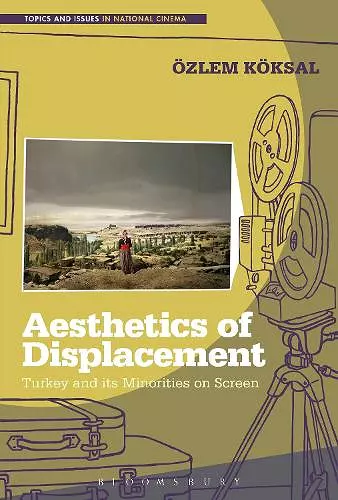Aesthetics of Displacement
Turkey and its Minorities on Screen
Format:Hardback
Publisher:Bloomsbury Publishing PLC
Published:28th Jan '16
Currently unavailable, and unfortunately no date known when it will be back

The first sustained analysis of Turkey’s minorities and cinema, reading films in the light of events that had an effect on minorities in Turkey.
This open access book focuses on aesthetic and narrative continuities of films, including Ararat, Waiting for the Clouds and Once Upon a Time in Anatolia, examining them in light of major historical event(s) and their context (political and social) as well as the impact these events had on the construction of both minority and Turkish identity.
Displacement does not only have an effect on groups’ and individuals’ ways of relating to their identity and their past but the knowledge and experience of it also has an impact on its representation. Looking at films that represent the experience of displacement in relation to Turkey’s minorities, Aesthetics of Displacement argues that there is a particular aesthetic continuity among the otherwise unrelated films. Ozlem Koksal focuses on films that bring taboo issues concerning the repression of minorities into visibility, arguing that the changing political and social conditions determine not only the types of stories told but also the ways in which these stories are told.
The eBook editions of this book are available open access under a CC BY-NC-ND 4.0 licence on bloomsburycollections.com. Open access was funded by Knowledge Unlatched.
A brilliant volume thatwill become a canonical text in the studies of the cinema of Turkey. Ozlem Koksal eloquently and impeccably scrutinizes the concept of displacement and its representation within films about minorities in Turkey. Koksal rigorously analyzes these films in the light of memory, language, and minority experience while providing a brilliant and engaging history of Turkish cinema—particularly its relationship to aesthetics, identity, and genocide. Aesthetics of Displacement is indispensable for anyone interested in issues around the representation of minorities, identity, and displacement, as well as for anyone studying cinema in and about Turkey. * Eylem Atakav, Senior Lecturer in Film and Television, the University of East Anglia, UK, and author of Women and Turkish Cinema: Gender Politics, Cultural Identity and Representation *
Through a series of skillful analyses of important films within ‘New Turkish Cinema’ dealing specifically with the issues faced by Turkey's minorities, Özlem Köksal has produced a book that foregrounds the importance of transnationalism yet at the same time remains profoundly political. She argues with justification that, within a country that since the days of Mustafa Kemal Atatürk has advocated a single construction of identity, many recent filmmakers have used their work to explore the ways in which ordinary people from a variety of minorities, including Kurds and Armenians, have tried to assert their identities through dialogue and negotiation with dominant discourses. Exploring film as an art-form and the work of a variety of directors, including Yesim Ustaoglu and Hiner Saleem, The Aesthetics of Displacement emphasizes the importance of understanding plural identities - not just within Turkey but in other parts of the world as well. At a time when the tendency to essentialize seems more and more pronounced, Köksal encourages us to appreciate the importance of dialogue between members of diverse cultures. * Laurence Raw, Professor of English, Baskent University, Turkey *
Aesthetics of Displacement: Turkey and its Minorities on Screen analyses certain films that have brought the long-standing repression of minorities in Turkey, until recently a taboo issue, into a new visibility. As the violent displacements of people in twentieth century Turkey materialise through image, figure and narrative structure, Özlem Köksal reveals ways in which the geographies of minority experience affect both narrative and cinematic space. She discusses the ghost as a recurring figure of the persistence of the past into the present, appearing sometimes as a character, also through memories of lost and forbidden languages, but most poignantly as a topographical ‘haunting’ of abandoned space and place. This fascinating study addresses questions of politics and culture through their representation in cinema, using films and their themes to draw attention to the complex, un-reconciled histories that still persist in Turkey today. * Laura Mulvey, Professor of Film, Media and Cultural Studies, Birkbeck, University of London, UK *
This is an exciting book about one of the world’s most exciting cinemas today; as you read Köksal’s Aesthetics of Displacement,you realise it pinpoints how films about past trauma also manifest suppressed and denied structures of feeling that trouble the present – specifically in Turkish cinema, but with wider implications for us all. * Chris Berry, Professor of Film Studies, King's College London, UK *
ISBN: 9781501306464
Dimensions: unknown
Weight: 503g
248 pages